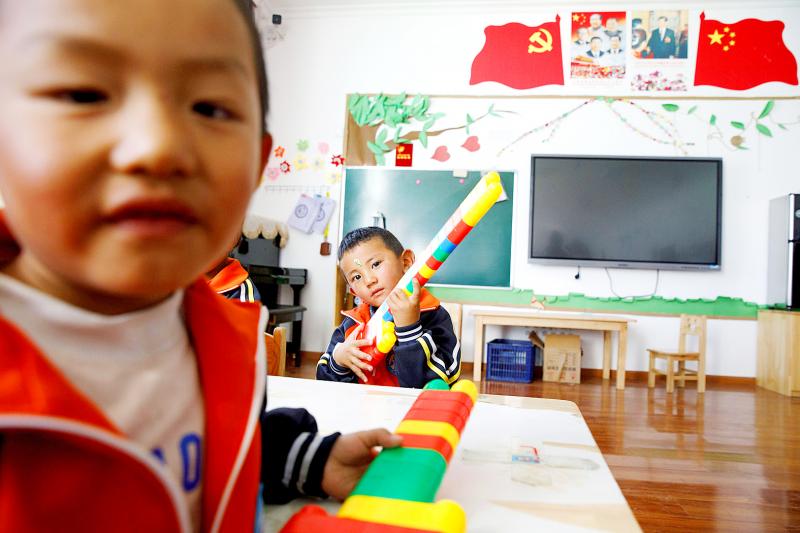Chinese officials yesterday defended their labor practices in Tibet, in the face of growing concerns about rights abuses in the region and Washington’s appointment of a senior official to scrutinize Tibetan affairs.
Tibet Governor Qi Zhala (齊扎拉) told a news conference in Lhasa that forced labor transfer “does not exist,” maintaining that the local government was focused on “increasing the idle workforce’s income through job-skills training.”
Qi, who was speaking about poverty-alleviation efforts, said that the Tibetan government had provided travel subsidies for people to work in other regions, and that they were free to come and go.

Photo: Reuters
The news conference came hours after US Secretary of State Mike Pompeo named US Assistant Secretary of the Bureau of Democracy, Human Rights and Labor Robert Destro as a special coordinator for Tibetan issues.
Destro is to be responsible for advancing dialogue between Beijing and the Dalai Lama, and protecting the religious, cultural and linguistic identity of Tibetans, the US Department of State said.
The post had been vacant since January 2017, according to the US Commission on International Religious Freedom.
Chinese Ministry of Foreign Affairs spokesman Zhao Lijian (趙立堅) at a daily news briefing in Beijing called the move to install Destro “political manipulation” meant to “interfere in China’s internal affairs and destabilize Tibet.”
Tibet and the neighboring region of Xinjiang have long endured intense social, security and religious controls, as China seeks to suppress what it calls “terrorist” and “separatist” elements.
Researcher Adrian Zenz last month released a report alleging that China was instituting a mass labor system in Tibet similar to the one in Xinjiang.
“The United States remains concerned with the PRC’s repression of the Tibetan community, including the lack of meaningful autonomy, the deteriorating human rights situation in Tibetan areas, and severe restrictions on Tibetans’ religious freedom and cultural traditions within China,” Pompeo said in a statement.
China’s policies toward Tibet have long been a subject of international dispute, with support for the region’s autonomy and the Dalai Lama often a bipartisan issue in Washington.
The US in July imposed travel restrictions on Chinese officials determined to be “substantially involved” in restricting access to Tibet.

TRAGEDY STRIKES TAIPEI: The suspect died after falling off a building after he threw smoke grenades into Taipei Main Station and went on a killing spree in Zhongshan A 27-year-old suspect allegedly threw smoke grenades in Taipei Main Station and then proceeded to Zhongshan MRT Station in a random killing spree that resulted in the death of the suspect and two other civilians, and seven injured, including one in critical condition, as of press time last night. The suspect, identified as a man surnamed Chang Wen (張文), allegedly began the attack at Taipei Main Station, the Taipei Fire Department said, adding that it received a report at 5:24pm that smoke grenades had been thrown in the station. One man in his 50s was rushed to hospital after a cardiac arrest

A car bomb killed a senior Russian general in southern Moscow yesterday morning, the latest high-profile army figure to be blown up in a blast that came just hours after Russian and Ukrainian delegates held separate talks in Miami on a plan to end the war. Kyiv has not commented on the incident, but Russian investigators said they were probing whether the blast was “linked” to “Ukrainian special forces.” The attack was similar to other assassinations of generals and pro-war figures that have either been claimed, or are widely believed to have been orchestrated, by Ukraine. Russian Lieutenant General Fanil Sarvarov, 56, head

SAFETY FIRST: Double the number of police were deployed at the Taipei Marathon, while other cities released plans to bolster public event safety Authorities across Taiwan have stepped up security measures ahead of Christmas and New Year events, following a knife and smoke bomb attack in Taipei on Friday that left four people dead and 11 injured. In a bid to prevent potential copycat incidents, police deployments have been expanded for large gatherings, transport hubs, and other crowded public spaces, according to official statements from police and city authorities. Taipei Mayor Chiang Wan-an (蔣萬安) said the city has “comprehensively raised security readiness” in crowded areas, increased police deployments with armed officers, and intensified patrols during weekends and nighttime hours. For large-scale events, security checkpoints and explosives

PUBLIC SAFETY: The premier said that security would be tightened in transport hubs, while President Lai commended the public for their bravery The government is to deploy more police, including rapid response units, in crowded public areas to ensure a swift response to any threats, President William Lai (賴清德) said yesterday after a knife attack killed three people and injured 11 in Taipei the previous day. Lai made the remarks following a briefing by the National Police Agency on the progress of the investigation, saying that the attack underscored the importance of cooperation in public security between the central and local governments. The attack unfolded in the early evening on Friday around Taipei Main Station’s M7 exit and later near the Taipei MRT’s Zhongshan